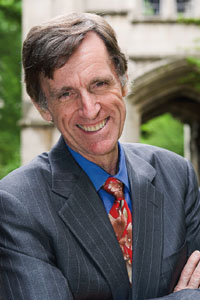Andrew Abbott, the Gustavus F. & Ann M. Swift Distinguished Service Professor in Sociology and the College
By William HarmsNews Office
 | |
Andrew Abbott describes the journey of all graduate students as one in which they learn how to become producers of knowledge, rather than consumers.
“It’s my job to help them find the social scientist inside them. What that means is going to be different for each student, but the trick is to help them figure that out,” says Abbott, the Gustavus F. & Ann M. Swift Distinguished Service Professor in Sociology and the College.
“The goal is to determine what the puzzles are that interest them and begin to help them learn how to figure out the puzzles,” he says.
Abbott, whose own work focuses on a wide range of topics, including the sociology of professions, urban sociology, historical sociology, the history of the Chicago School of Sociology, sociological methodology and general social theory, says he is energized by talking with students who come to him to work on their own wide range of interests.
“I have students who are interested in criminology, urban sociology and education. They all have a passion of interest in something,” he says.
What keeps the students engaged, however, is as much a matter of character as it is intellectual ability, he says.
“Students have to learn to be persistent, to be patient. They go through a long period of time working on a dissertation, for instance, when they don’t receive constant payoffs and don’t see where it’s all leading, and yet they just have to keep going,” he says.
What keeps students engaged in their work is an ability to follow their curiosity and develop a drive to try to figure out problems in society, Abbott says.
In his introductory graduate courses, Abbott often provides his students with puzzles to work out, so they can begin to look at situations in new ways and learn to be persistent in overcoming challenges. The students also spend time talking about how to build an argument and how to develop new ideas, Abbott says. Much of his teaching is one-on-one when he meets with students to talk about their projects. “There’s a real energy with our students. They have a great excitement for what they’re working on,” he says. “I also send out an e-mail to them early in the quarter to let them know what I’ve been working on,” he says.
By helping them develop good habits of scholarship and encouraging them to follow their curiosity, Abbott feels he is helping them become well prepared for their own lives as scholars. “The standards they adopt will be the standards of the future. They are the ones who will be keeping the discipline alive for the next 30 years,” he says. “After all, we’ll be gone soon enough.”
Abbott, who joined the Chicago faculty in 1991, received an A.B. from Harvard University in 1970 in history and literature. He earned an A.M. in 1975 and a Ph.D. in 1982, both in Sociology, from Chicago.
![[Chronicle]](/images/sidebar_header_oct06.gif)